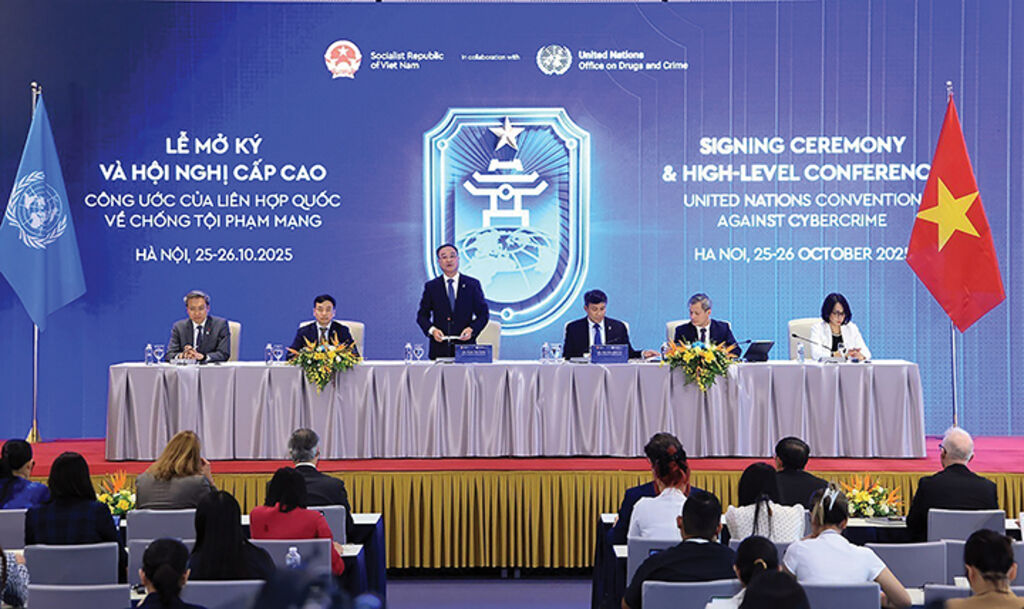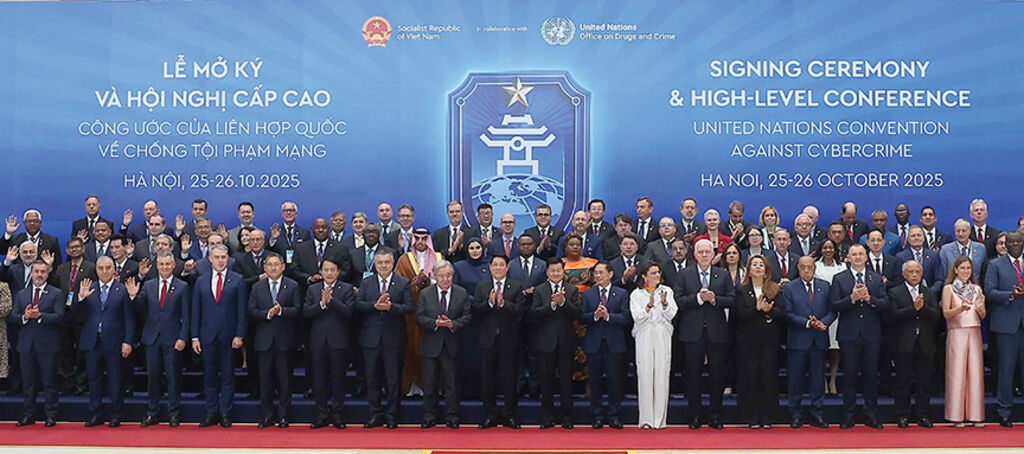 |
| View of the international press conference highlighting key outcomes of the Hanoi Convention Signing Ceremony__Photo: Tuan Anh/VNA |
The United Nations Convention against Cybercrime, also known as the Hanoi Convention, will truly become a beacon guiding global cooperation on cybersecurity, leading the world toward the goal of “technology for humanity, digitalization for peace,” Politburo member and Minister of Public Security General Luong Tam Quang affirmed on October 26.
Delivering the closing remarks at the Hanoi Convention Signing Ceremony and High-Level Conference held in the Vietnamese Capital City of Hanoi, Quang confirmed that the opening for signature was a great success, with representatives from 72 countries signing to join the convention.
Alongside the ceremony, the high-level conference featured vibrant side discussions and events, offering profound insights that vividly reflected the global landscape of cybercrime, the efforts of each nation, organization and individual, as well as the urgent need to strengthen international cooperation in this field. In addition, it put forward numerous proposals, initiatives and commitments to effectively implement the Hanoi Convention, aiming to bring about significant progress in the prevention and combat of cybercrime in the coming time.
The minister emphasized three key points of consensus.
First, the convention represents a historic and strategic milestone, reflecting the shared vision, responsibility, joint efforts, and spirit of cooperation within the international community for a safe, trustworthy cyberspace, for humanity, peace and sustainable development. It establishes a legal foundation for international collaboration while reaffirming the importance of multilateral cooperation, equal dialogue and respect for national sovereignty, ensuring that cyberspace truly becomes an environment that serves peace, justice and sustainable growth.
Second, the presence of numerous countries, international organizations, institutions and individuals at the signing ceremony demonstrated the solidarity, sense of responsibility, political will, and strong determination of the international community in the fight against cybercrime. It also opened up new opportunities to enhance cooperation, strengthen mutual trust, and promote the common progress of humankind.
Last, the adoption of the convention by consensus and the successful organization of the signing ceremony in Hanoi reaffirmed the central role of the UN in fostering international cooperation to address global challenges. It also reflected the trust and confidence of the UN and the international community in Vietnam’s role, credibility, capacity and responsibility, particularly that of the Ministry of Public Security, in tackling global issues, first and foremost ensuring cybersecurity for a safe, humane and sustainable cyberspace.
For a safe, just and humane digital future, the minister appealed to countries, organizations and businesses to strengthen cooperation and effectively implement the Hanoi Convention through solidarity and strategic trust, as well as a spirit of responsibility, sharing of experience, technology and resources, particularly in supporting developing countries.
Vietnam, backed by its legal framework and national strategies, is firmly committed to fully, seriously and responsibly fulfilling its obligations under the convention, strengthening bilateral and multilateral cooperation, and coordinating actions with other member states in combating cybercrime, Quang affirmed.
 |
| President Luong Cuong and UN Secretary-General António Guterres pose for a group photo with heads of delegations attending the Signing Ceremony of the Hanoi Convention__Photo: VNA |
Statistics of the signing ceremony and related events
Following the closing session of the signing ceremony, leaders of the Ministry of Public Security and Ministry of Foreign Affairs released statistical outcomes of the ceremony and related events.
Speaking to the media in a press briefing on October 26, Deputy Minister of Public Security Pham The Tung said the event welcomed more than 2,500 delegates from 110 national delegations, 150 international, regional and private organizations along with over 50 research institutions.
“This figure exceeded our expectations, reflecting the broad and genuine interest of the international community and friends around the world in this event, which is the first of its kind held in Vietnam,” he said.
The event also received strong attention from domestic and international media, with more than 400 reporters from 189 news agencies.
The main signing ceremony in Hanoi was broadcast live on the UN Web TV system, creating opportunities for access and outreach to member states and UN bodies through simultaneous interpretation in all six official UN languages.
“This is the first time an event hosted by Vietnam has been communicated in all official languages of the United Nations,” the official said.
Out of the 72 signatories, 64 signed during the in-session ceremony in Hanoi. Geographically, 19 are from the Asia-Pacific region, 21 from Africa, 19 from Europe plus the European Union, and 12 from Latin America, showing the convention’s global reach and balanced geographical representation.
The event is also one of the largest convention openings in the past 10 years, according to the UN.
During the sideline events and discussions, there were 71 speeches from national representatives, international organizations and technology corporations, offering varied and constructive perspectives for the upcoming implementation of the convention.
Several aspects of the convention were analyzed, evaluated and discussed by leaders and experts in eight thematic workshops and roundtables organized by Vietnam and partner organizations, as well as 37 side events hosted by international, regional and corporate entities.
Meanwhile, Deputy Minister of Foreign Affairs Nguyen Minh Vu said the fact that the convention already had 72 signatories was an excellent result that would drive forward its early implementation.
In addition, many speakers emphasized the importance of international cooperation and coordination in implementing the convention, which would significantly enhance its effectiveness.
“Given the nature of cybercrime, no single country can effectively address or handle it on its own. This is a global, borderless issue and therefore discussions, exchanges, consensus-building, solidarity and shared commitment among nations to jointly implement the convention are extremely important,” he said.
The event also carries great significance for countries like Vietnam, where technological infrastructure is still being developed, as delegates highlighted the need to strengthen capacity building for UN member states, especially developing countries, according to Vu.
“I believe these outcomes will serve as a foundation for Vietnam and other countries to strengthen effective international cooperation in combating cybercrime, while also promoting the transfer of technology and resources from developed nations to developing ones in the future,” he said.
Praise for Vietnam’s hosting of landmark convention signing ceremony
The Signing Ceremony and High-Level Conference of the Hanoi Convention left a strong impression on international delegates for its professionalism and solemn organization, marking a successful debut that underscores Vietnam’s growing capability to host major global events.
Ghada Waly, Executive Director of the United Nations Office on Drugs and Crime (UNODC), said the journey to the signing of the convention had been long and challenging, involving more than 420 hours of formal negotiations and countless hours of informal discussions, with input from 160 stakeholders.
She thanked Vietnam for bringing nations together toward a shared global goal and said the UNODC was proud to support Hanoi in organizing the event. Waly expressed confidence in Vietnam’s continued leadership in translating the new convention into concrete actions.
The official added that, if implemented effectively, the Hanoi Convention would make the city remembered not only as the “host of the signing ceremony” but also as a model for digital diplomacy among developing nations.
Israeli Ambassador to Vietnam Yaron Mayer praised the event as exceptionally well organized, noting that it coincides with a year of major milestones for Vietnam, including the 80th anniversary of its National Day.
He said delegates witnessed a truly impressive opening ceremony attended by delegations from around the world, including the UN Secretary-General and other senior leaders. Even countries that had not yet signed also recognized the importance of being present here, the diplomat said, noting that everything ran smoothly.
For his part, Belarusian Minister of Internal Affairs Ivan Kubrako said the selection of Vietnam as the host of the signing ceremony reflected its pivotal role in global efforts to combat cybercrime and its strong commitment to addressing cross-border security challenges. Without security, no field of life can develop, he stated.
This event would open new opportunities for Vietnam to expand international cooperation, not only in cybersecurity but also in many other areas, the minister said, elaborating that it was also a chance for the country to enhance its voice on the international stage.
Meanwhile, Olivier Onidi, Deputy Director-General of the Directorate-General for Migration and Home Affairs at the European Commission, thanked Vietnam for taking the initiative to host the milestone event. He said it sent a strong signal from Asia - a region increasingly affected by cybercrime - about the willingness to join hands in tackling this global threat.
The official added that for the Hanoi Convention to be implemented effectively, countries should prioritize ratifying and integrating its provisions into domestic laws while sharing best practices and expertise to ensure the convention’s benefits reach all member states.- (VLLF)









